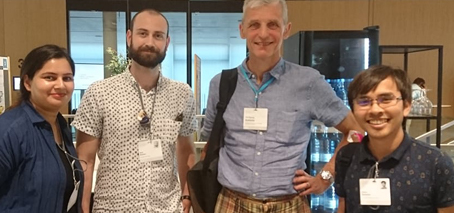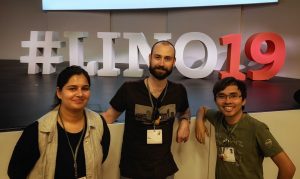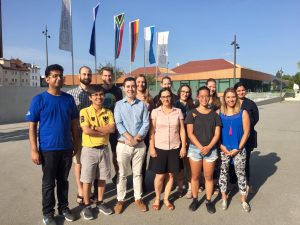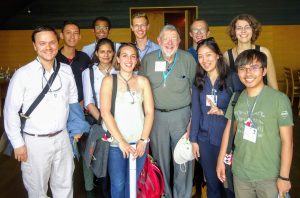Three FLEET ECRs were fortunate to attend the 69th Nobel laureate meeting in Lindau, Germany, forming an impressive 30% of Australia’s ten-person delegation elected and led by the Australian Academy of Science.
This year’s meeting focused on physics, and a number of senior FLEET were amongst the laureates. Our ECRs were pleased to connect with Wolfgang Ketterle, William Phillips, and Kostya Novoselov.
In all, 39 laureates attended this year, with several of them having been awarded their Nobel Prize in fields directly relevant to FLEET.
For our three young scientists, highlights included meeting the Nobel laureates prominent in their own particular field, and discovering common experiences with both senior laureates and other early-career researchers.
- 39 Nobel laureates including the 2018 laureates in physics Donna Strickland and Gérard Mourou
- 580 international young scientists from 89 countries
- Ten ECRs from Australia (three from FLEET)
- Key topics: laser physics, gravitational waves, dark matter and cosmology.
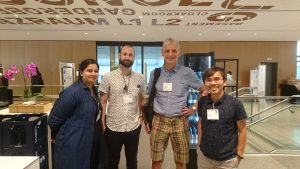
Hareem, Matt and Eli with Wolfgang Ketterle (Nobel Prize in Physics 2001, Bose-Einstein condensates), and FLEET Committee member. Click to listen to Wolfgang’s talk.
“The Lindau meetings definitely regenerated my enthusiasm and confidence for working in science. Talking to fellow young scientists made me realise that almost every one of us, especially the postdocs, have the same struggles. Most importantly, talking to the Nobel laureates and hearing their lectures and discussions supports this experience, which they also experienced during their early career, yet they all have overcome it.”
–Eli Estrecho, RF ANU
“Along with all the inspirational research talk with the other young scientists and getting to understand other fields of research, the personal aspect of the meeting in a scientific community setting was what made it a truly outstanding trip.”
–Hareem Khan, RMIT
“I got quite a lot out of talking to people at a similar career stage as me. Many of us, regardless of background, seem to struggle with many of the same issues like self-doubt, imposter syndrome, work-life balance etc. It’s reassuring to know that these other, clearly very talented people have had the same issues.
–Matt Reeves, UQ
See below for full reports from Eli, Hareem and Matt.
Dr Eliezer Estrecho, Research Fellow, ANU
The Lindau meeting is great. It is unique – indeed, a once-in-a-lifetime opportunity.
The format of the meeting includes lectures, Agora talks, open discussions, and small and big social events, like walks and dinners. In the lectures, the Nobel laureates give a mix of personal stories, Nobel-winning work, and current research directions.
These lectures include personal anecdotes which are both inspiring and easy to relate to.
I also liked the open discussions which usually involves a mediator, three Nobel laureates and two young scientists. The topics were great, especially the one about postdoc and student life – giving young scientists advice on how to handle life as a researcher.
I was also lucky to have a “Science Walk” with Bill Phillips on an apple farm for about 1 hour, together with about 10 young scientists. It was a good conversation/discussion. It turns out that most of us young scientists have similar questions to ask Bill, especially on his life as a scientist. We learned a lot about his personal life and apparently, we have a lot of similarities: he sings in a choir, played the piano when he was little, and he is a Christian, but I can’t beat his seemingly endless curiosity.
The Australian delegation, together with few delegates from Latin America, had dinner with Brian Schmidt and Steven Chu. We had a fantastic night talking about politics, working in politics, science and conspiracies, and a whole lot of other things.
My main takeaway: The Lindau meetings definitely regenerated my enthusiasm and confidence for working in science. I was a little bit tired and confused about my directions both in life and research which is probably due to the transition from PhD to postdoc life.
Talking to fellow young scientists made me realise that almost every one of us, especially the postdocs, have the same struggles.
Most importantly, talking to the Nobel laureates and hearing their lectures and discussions supports this experience, which they also experienced during their early career, yet they all have overcome it.
I really like how Bill goes home to tuck in his baby to sleep at night then go back to the lab to continue an important experiment.
As I write this, I’m still in Berlin and will move to Wuerzburg next week for a research visit to FLEET PI Sven Hoefling for 4 weeks.
Hareem Khan, PhD student, RMIT
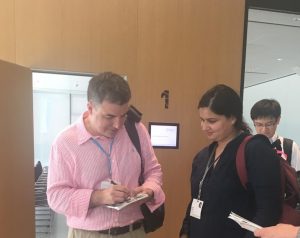
Hareem with Kostya Novoselov (Nobel Prize in Physics 2010, 2D materials). Click to listen to Kostya’s talk.
Attending the 69th Nobel laureate meeting in Lindau, Germany was an absolutely amazing opportunity.
It was a pretty full-on week of well-planned events…
Sunday kicked off with the opening ceremony and it was surreal to see the Nobel laureates upfront waving back at us.
Monday was the highlight of the week for me as Kostya Novoselov had his lecture and open exchange session (he received his Nobel Prize in Physics for pioneering 2D materials, which is my research area) – he was attending the meeting the first time in 10 years. The dinner that night was hosted by one of my home countries, South Africa.
There were various formats in which the laureates communicated such as lectures, open exchanges and Agora Talks.
The common trait in all the Nobel laureates was their humility and how down to earth they were.
What set this meeting apart from any other typical scientific conference setup is not only the various session formats but also the interaction at a personal level. Many of the laureates had profound life skills advice to share with us – particularly on balancing scientific research and family life, which really resonated with me on many levels.
Seeing real life examples of people who got the penultimate prize in their field but still have the bigger picture of life in view was truly inspiring.
Attending Wolfgang Ketterle’s (Nobel laureate that pioneered BECs and was attending the meeting the first time in 18 years) open exchange was another enlightening event of the meeting. I walked out of the session understanding BECs a hundred times better. He had a very good way of communicating his message to the larger audience keeping us fully engaged for approx. 1.5 hours, highlighting for all of us the importance of scientific communication skills.
Another interesting aspect that came up was the fact that most of the laureates did not have this bullet-proof rock solid life plan. They all had experienced incredible ups and downs, including jobless phases, family crises’, and moving across continents to start over which they overcame.
For example, Wolfgang Ketterle discussed having to zigzag careers to experiment with different things and get a feel of where you finally want to be.
A discussion with the Australian Nobel laureate Brian Schmidt was another interesting part of the meeting. He continuously stressed on the fact that family is very important and if you don’t have that then nothing else is really worth it which is something you hardly hear in competitive academic environments. On the family note, it was also refreshing to see a few academic mothers who were expecting or had travelled with their babies with the youngest being 12 weeks to attend the conference. We travelled as a part of the Australian delegation and were well taken care of by Prof. Jagadish Chennupati and his wife Vidya.
My favourite quote was “Don’t get too worried when things are not balanced in your life at a given moment, you have time. It’s about the time-average. Try to be balanced in the long run”- Wolfgang Ketterle.
I would say the main takeaway from this meeting I had was that’s it is okay not to have everything under control all the time. Research as well as life brings about a lot of obstacles and failures that seemingly set you back but eventually with time things do work out if you persist. This was really refreshing for me and sort of put things in perspective for me as being a mother of two small kids I am constantly worrying about performing equally well in all my roles and this can get pretty overwhelming.
You would think this is something we all know but sometimes a reminder about what truly matters in life is needed and being in a good space personally impacts performance at work as well.
And this came up in discussion with many of the other participants as well so it seems to be a common struggle.
So along with all the inspirational research talk with the other young scientists and getting to understand other fields of research, the personal aspect of the meeting in a scientific community setting was what made it a truly outstanding trip.
Dr Matt Reeves, Research Fellow, UQ
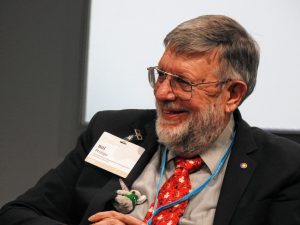
William Phillips (Nobel Prize in Physics 1997, cold atoms). FLEET Partner Investigator. Click for Bill’s talk on the new quantum-based system of units.
Lindau was really a unique, once-in-a-lifetime experience.
Probably nowhere else do you get this unique mix of people who have defined entire fields of research with people like us, whose careers are just starting, and across such a diverse range of disciplines.
The week was jam-packed with sessions and social activities. There were four different types of sessions — Lectures, Agora Talks, Open Discussions, and Panel Discussions. Around this, there were organised social activities where a small group of young scientists got some more personal interaction with the laureates during activities like “Science Walks” and “Laureate Lunches”. A lucky few even got to go on a zeppelin ride with a laureate.
The week kicked off with Brian Schmidt giving a great opening address touching on issues such as the need for more open science practices (open access and sharing of data), and the need for communication with the public in an age where misinformation is becoming an increasingly important problem.
Personally, I was a fan of the Agora talks — they were a kind of 50/50 split between a laureate presenting research etc. and a question and answer session with the audience. It thought it hit a nice balance between hearing something from the laureates and seeing what the participants were interested to ask. Carl Wieman gave an interesting Agora talk on his research on teaching in physics. Steven Chu gave a great one on his research which somehow manages to span physics, chemistry, biology and medicine all at the same time. I can’t get my head around how that guy can do so many things.
Since everyone’s backgrounds were so broad, there were plenty of opportunities to learn about things that I knew nothing about at all. I enjoyed the panel discussion “Dark Side of the Universe”, which was about dark matter and dark energy, and asking a few questions to some astro/cosmology people about it afterwards.
The Australian delegation had dinner one evening with Steven Chu and Brian Schmidt and I thought it was particularly interesting to hear about some of their experiences outside of research. For example, it was fascinating to hear about Steven Chu’s time working in policy for the Obama administration and his experience in dealing with the BP oil spill, and Brian’s experiences running ANU.
Wolfgang Ketterle gave an excellent open discussion session. It was interesting to hear how he was working to cultivate his abilities in science communication (he really is very, very good, I am sure Hareem will agree with me), doing stuff like watching recordings of his own lectures. It sounds very hard to bring yourself to do, but clearly it pays off.
I had a Laureate Lunch with Michael Kosterlitz. Like most of the laureates, he seemed like a very humble guy. I enjoyed hearing his anecdotes from his time working with David Thouless, who he clearly admired a lot. Apparently, he thinks he and David were the perfect team because David knew very well that they were going against conventional wisdom whereas Michael was a keen postdoc, oblivious to the fact that we were going against conventional wisdom.
I also ended up having an impromptu lunch one day with Bill Phillips. Surprisingly Bill was familiar with our recent paper on vortex clustering and asked me to explain it a bit more over lunch. I was a bit surprised he seemed so interested in it, but then again Bill seems interested in pretty much everything — in my previous encounters with Bill, he is always easy to spot at a conference; he is the guy up the front that has a good question after every single talk.
Main Takeaway: Similar to Eli, I got quite a lot out of talking to people at a similar career stage as me. Many of us, regardless of background, seem to struggle with many of the same issues like self-doubt, imposter syndrome, work-life balance etc. It’s reassuring to know that these other, clearly very talented people have had the same issues.

